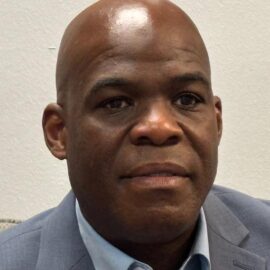
Notice the smooth sidewalks as the motorized wheel chair navigates. Not here. But for some sidewalks that will change.
New Orleans officials have agreed to a legal settlement that forces them to bring sidewalks into compliance with the federal Americans with Disabilities Act, fulfilling a long-delayed pledge that will mean the construction of thousands of curb ramps across the city. The commitment is part of a consent judgement, ratified this month in the U.S. District Court for the Eastern District of Louisiana, between the city and three local men with disabilities who filed a lawsuit over the lack of navigable sidewalks for people using wheelchairs. The plaintiffs, Joseph Henry, Francis Falls and Stephan Namisnak, all of whom use wheelchairs to get around, claimed in their lawsuit that the city had failed to implement a plan first put forward at the end of 2011 to make city streets accessible to people with disabilities. Only about 10% of the curb ramps in the plan had been built before work stalled in 2020 with no firm timeline completion.
nola.com
When I walk my dog I come home on the sidewalk up Napoleon as it is smooth. There are places I do walk where there is a very uneven sidewalk. I am sure you have seen the same. Now try the uneven sidewalks with a wheel chair.
The plaintiffs said that left them and other wheelchair users in the city at risk, as they were forced to navigate traffic in the streets when they were not able to access sidewalks. “The previous transition plan identified the problems and the solutions but it just ended up gathering dust on a shelf,” said Andrew Bizer, the lawyer for all three plaintiffs. Henry lives on Fig Street in the Hollygrove area; Falls on Clio Street near Martin Luther King Jr. Boulevard in Central City; and Namisnak lives on Pacific Avenue in Algiers Point. In the consent judgement, the city agreed to a specific schedule to spend $536,000 to add hundreds of curb ramps along 48 intersections in each of the plaintiffs’ parts of the city. Those include dozens along Martin Luther King Jr. Boulevard, along Leonidas Street Uptown, and along Opelousas Avenue on the West Bank. Most of that work will need to be completed by late 2023. The men were also awarded a total of $40,000, which includes their attorneys fees.
The city also will do accessible ramps through out the city in the future.
More broadly, the city agreed under the consent judgement to a process that will require them to build thousands of curb ramps throughout Orleans Parish over the next two years or else they could face further court action and be required to pay costs. City spokesman Beau Tidwell said Mayor LaToya Cantrell’s administration intends to make good on the commitment this time. “The city is determined to make moving about New Orleans easy and accessible for all its residents and visitors and has taken steps to become ADA-compliant,” he said. Tidwell said the Department of Public Works has started the process to update the plan, which would be its third iteration in the past decade. The planning process will include a public meeting and developing an interactive website to track the compliance status of each individual curb ramp, which was part of the court agreement.
Some of the cost will come from other sources.
The money earmarked for the curb ramp building program will come partly from the FEMA-funded $1.7 billion Joint Infrastructure Recovery Request road-building program that has been underway for the last two years, Tidwell said. The court judgement said the public meeting must be held no later than March 1, 2022 and the new plan published on the website no later than August 1, 2022. It said the interactive website should have dates and funding for each of the curb ramps and be updated regularly. The judgement also has enforcement provisions so that anyone can challenge the city for not fulfilling its obligations according to the new plan. If the city still doesn’t make good on any individual ramp within 30 days of a challenge, it will be back in court and might have to pay costs. Bizer said that more than three decades after the passage of the ADA, there is finally a mechanism in place to make sure the city complies. “The most important thing we have is the city’s attention to this problem,” he said. “Now we have a commitment to modify thousands and thousands of curb cuts and a way for the public to keep the pressure on through the courts.”
It is necessary to abide by the ADA and it takes committed individuals to make sure the city complies.
Falls was previously a plaintiff in a lawsuit brought against the city, the Regional Transit Authority and private transit operator Transdev, which forced the defendants in that case to bring the St. Charles Avenue streetcar line into ADA compliance. Bizer also was the attorney for that lawsuit, in which the court awarded $1,500 in damages to Falls. In December, 2020, the city formally marked the completion of the program to make the historic St. Charles line wheelchair accessible. The $560,000 for that upgrade had been provided by a federal grant.
As school teachers both my wife, a special ed teacher, and me in math had to comply with our students. I found that many of the applications for the disabled helped my regular students as well.



